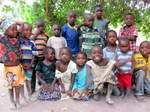Non-malaria febrile illness
Non-malarial causes of fever can be dangerous but are frequently misdiagnosed as malaria. This wastes malaria treatments and leaves potentially serious causes of fever untreated.
Useful resources | Peer-reviewed publications | Projects | NewsUseful resources
Training manuals from REACT study in Cameroon
The REACT Facilitator and Participant Manuals on improving malaria diagnosis and treatment
TACT trainer and trainee manuals and patient leaflet
The TACT training manuals and patient leaflet were designed to support the use of malaria rapid diagnostic tests (RDTs).
Prospectus du patient et manuels du formateur et du stagiaire pour TACT
Le prospectus du patient et les manuels de formation pour TACT ont t conus pour faciliter lutilisation des tests de dpistage rapide du paludisme (RDT).
Manuels de formation pour l'étude REACT au Cameroun
Les manuels du formateur et du participant REACT sur l'amlioration du dpistage et du traitement du paludisme
Manuais TACT para formadores e formandos e folheto TACT para pacientes
Os manuais de formao TACT e o folheto TACT para pacientes foram concebidos para promover a utilizao dos testes de diagnstico rpido (RDT) da malria.
Manuais de formação do estudo REACT realizado nos Camarões
Manuais REACT para formadores e participantes sobre a melhoria do diagnstico e tratamento da malria
Peer-reviewed publications
Real-time PCR threshold cycle (Ct) cut-offs help to identify agents causing acute childhood diarrhea in Zanzibar
Journal of Clinical Microbiology
Causes of non-malarial febrile illness in outpatients in Tanzania
Tropical Medicine & International Health
Projects

Identifying non-malaria illnesses that cause fever
[Project summary in Français / Português]
Scientific [Project summary in Français / Português] Scientific 
Identifying causes of fever in children under five in Zanzibar
News
World Malaria Report 2013: Major progress against disease 'still fragile'
Malaria deaths have declined by 45% globally since 2000 - thanks to prevention and control measures, political commitment and expanded funding. But improving access to diagnosis andWhat are the challenges of scaling up rapid diagnostic tests in Sub-Saharan Africa?
The World Health Organization recommends using malaria rapid diagnostic tests (RDTs) and prescribing antimalarials only to patients who have a positive test result. As programmes gearProgress in malaria leads to overuse of antibiotics
Improving malaria diagnosis decreased the waste of malaria drugs in patients who didn’t need them. Now, clinicians who don’t know what else is causing fever tend to overprescribePatients with fever need better diagnosis and appropriate treatment
Many people who visit health clinics with fever in malaria endemic areas do not have malaria, but they still receive antimalarial drugs. A new report from the World Health OrganizationNew publication summarises ACT Consortium findings
"Answering key questions on malaria" is the lay summary of 25 research studies in 10 coutries in Africa and Asia. It is now available to the public at no cost, in English,Malaria diagnosis training manuals released
Health workers may now benefit from training manuals to best use malaria rapid diagnostic tests (RDTs). The resource was developed during a clinical trial in Tanzania and the authorsMalaria control guidance in Ebola-affected countries
Guinea, Liberia and Sierra Leone have a high burden of malaria and together saw an estimated 6.6 million malaria cases and 20,000 deaths in 2013. WHO has issued guidance on temporaryBetter diagnosis, better malaria control: Event on 20 April 2016
Join us in London or online to commemorate World Malaria Day in an interactive session with free resources and a discussion about the importance of malaria diagnosis and the challengesASTMH 2014: Malaria highlights
Bill Gates' announcement to increase malaria funding, strategic plans from the WHO to eliminate malaria and ACT Consortium research results were some of the malaria contributions seenACT Consortium researchers present at ASTMH 2014
The 63rd annual meeting of the American Society of Tropical Medicine and Hygiene takes place between 2-6 November in New Orleans, USA. Find out which research results we will present

